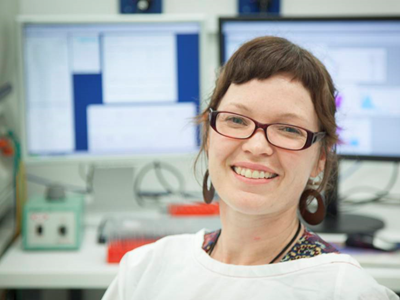May 30, 2019 Print
Multiple sclerosis (MS) is a chronic neurological disease, in which the immune system periodically attacks the brain and spinal cord. For World MS Day, we spoke to MS researcher Dr Fiona McKay to learn about the role of certain genes and cells in MS.
MS can cause a range of overt symptoms like paralysis and tremor. However, many of the symptoms of MS, such as chronic pain and fatigue are ‘hidden’, but can be extremely debilitating. For this reason, MS is sometimes called an ‘invisible illness’.
 Dr Fiona McKay
Dr Fiona McKay
Dr Fiona McKay, an MS researcher with The Westmead Institute for Medical Research and University of Sydney, says that while the symptoms of MS are not always visible, the damage to the brain and spinal cord accumulates over time, and ultimately results in disease progression.
Currently, there are 12 drugs available in Australia to treat MS. While some of the newer generation therapies have greatly improved outcomes for people with MS, these are still not 100% effective in stopping disease, and not every patient responds to an individual treatment.
Dr McKay said, “There is still a pressing need to understand more about the immune dysfunction in this disease, towards the ultimate goal of stopping and reversing MS.
“Genetics play an important role in predisposition to MS, and in the last decade more than 200 MS risk genes have been identified. Finding the genes been an international effort – it’s such a rich source of information, and we’re just at the start of translating this into new insights into the disease process.
“Our current research stems from recent discoveries that genes controlling certain immune cells, called natural killer or ‘NK’ cells, may play a role in MS."
In healthy individuals, NK cells kill harmful cells, like cancer cells and autoimmune cells.
“In people with MS, we have evidence suggesting that NK cells are dysfunctional,” Dr McKay said.
“We are investigating whether this reduces their ability to kill autoimmune cells, thereby allowing the attack on the nervous system to continue.
“We are also working on boosting the ‘killer’ activity of NK cells in MS, so that they kill autoimmune cells more efficiently. For this work, we are investigating the possibility of repurposing drugs developed for other diseases such as cancer.
“NK cell treatment could potentially work alongside other existing treatments to improve the clinical outcome.”
Approximately 23,000 Australians currently live with MS
1. Dr McKay said the personal cost of the disease is significant and can be devastating. MS is also associated with high economic cost- approximately $1 billion annually
1 in Australia alone.
This highlights the urgency of stopping and reversing MS.
“We need a better understanding of how the disease is propagated, as well as better therapies to improve the quality of life of people with MS, and we’re excited to be part of this global effort.”
Reference: Palmer AJ, Colman S, O'Leary B, Taylor BV, Simmons RD.
The economic impact of multiple sclerosis in Australia in 2010. Multiple sclerosis (Houndmills, Basingstoke, England). 2013;19(12):1640-6.
Dr Fiona McKay is affiliated with The Westmead Institute for Medical Research and The University of Sydney.